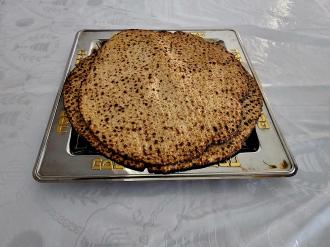Question #1: Comfort
“How do I wash my hands when I finish using the comfort facilities on Yom Kippur?”
Question #2: Knuckle down
“Why do we wash negel vasser only until our knuckles on Yom Kippur, but until the wrist every other morning?”
Question #3: Bride
“May a woman who married during Elul wash her hands and face on Yom Kippur?”
Introduction:
As we all know, one of the mitzvos of the Torah is that we should afflict ourselves on Yom Kippur. Although this mitzvah is observed primarily by refraining from eating and drinking, the Mishnah teaches that it also includes abstaining from washing, wearing shoes and certain other pleasurable activities (Yoma 73b). The Gemara (77b) explicitly states that this includes washing even a small part of one’s body, and even forbids resting one’s body on wet clay or mud (Yoma 78a). Yet, under certain circumstances, the Mishnah and the Gemara permit even washing on Yom Kippur. Our first goal will be to understand when this is permitted and when not, and why it is so.
Who may wash?
The Mishnah (Yoma 73b) mentions that the king and a bride are permitted to wash their faces. The Gemara (Yoma 78b) explains that, since the posuk requires us to see the king when he is handsome (Yeshayohu 33:17), he should be freshly washed. A bride who married within 30 days of Yom Kippur is permitted to wash her face, and, according to some authorities, also her hands (Rabbeinu Yonasan). This is so that her newlywed husband should not see her in a way that is unattractive (Yoma 78b).
Why thirty days?
We find the timeframe of thirty days in regard to a kallah in a few instances (Yoma 78b; Kesubos 4a). The same principle permits a newlywed bride to wear cosmetics, should she become a mourner, G-d forbid, during the first thirty days of her marriage (Kesubos 4a).
Although the Shulchan Aruch expressly rules that a bride may wash her face on Yom Kippur during the thirty days after her marriage, some prominent later authorities note that this is true only when her husband will see her in the course of the Yom Kippur day. If he does not return home all day Yom Kippur, and will therefore not see her, there is nothing gained by her washing, and therefore she should not (Chayei Odom 145:15).
At this point, let us address the last of our opening questions:
“May a woman who married during Elul wash her hands and face on Yom Kippur?”
If she married within thirty days of Yom Kippur and her husband will return home during the day and see her, the Shulchan Aruch rules that she should. If he will not return all day, then the Chayei Odom rules that she should not. I suggest individuals ask their rav or posek for a definitive ruling.
Walking through water
The Gemara adds several other instances where it is permitted to wash or to get oneself wet on Yom Kippur. One may cross a small body of water on Yom Kippur in order to attend a shiur, to see one’s rebbe, or even to check one’s field. The Gemara permits someone who wants to see his rebbe to cross a small body of water to do so, but prohibits a rebbe from walking through water to see his talmid on Yom Kippur. In these instances, it is permitted to cross still water, even if the water runs as high as your neck. If the water is flowing, such as a stream, one may walk through it only if it reaches no higher than one’s waist. This difference is not because of Yom Kippur concerns, but because of danger. The Gemara forbids walking through flowing water higher than one’s waist because of concern that one could be swept away by the current.
Regarding the many other halachic issues involved in these water travels on Yom Tov – such as the questions of carrying water, laundering clothes, squeezing water out of clothes – these issues are raised and discussed by the Gemara and the rishonim. Since our topic is washing on Yom Kippur, we will leave those topics for different articles.
Washing to clean yourself
The Gemara permits washing oneself on Yom Kippur if one gets muddy or dirty (Yoma 77b). Similarly, one may wash off the effects of a nosebleed (Shulchan Aruch, Orach Chayim 613:1). There is a dispute among early acharonim whether one may wash off sweat. Some authorities permit washing off uncomfortable sweat, just as one may wash off dirt (Levush and Magen Avraham 614:1), whereas others prohibit this (Mateh Efrayim, Bach and Taz, Orach Chayim 613:1). The Mishnah Berurah concludes that someone who is an istanis, meaning highly sensitive, may follow the lenient approach, but otherwise one should not.
How much may I wash?
The Rambam (Hilchos Shevisas Asor 3:2, as explained by Magen Avraham) rules that when washing off dirt, one must be careful to wash only the areas that are dirty, but one may not do a general washing. Notwithstanding that this ruling is accepted by all later authorities, a later posek rules that if someone has become dirty in many places and it is easier to wash his entire body, he may do so (Mateh Efrayim 613:1).
Washing out one’s mouth is forbidden (Rema, Orach Chayim 613:4), out of concern that one might swallow some of the water (Mishnah Berurah 613:11). Swallowing even a drop of water is prohibited min haTorah. One prominent acharon permits washing one’s mouth with vinegar or other non-drinkables, since swallowing these items would not violate a Torah law (Mateh Efrayim 613:3).
Washing negel vasser
At this point, let us examine the halachic background behind the second of our opening questions: “Why do we wash only until our knuckles on Yom Kippur, but until the wrist every other morning?”
As we all know, we wash our hands immediately upon arising in the morning three times on each hand, being careful to wash until the wrist. This practice is usually referred to by its Yiddish name, negel vasser. However, on Yom Kippur the practice is modified somewhat. The rishonim discuss whether one is permitted to wash negel vasser on Yom Kippur. The Mishnah and the Gemara do not discuss this question directly, but there is an allusion to it in the following passage:
“A woman may wash one hand in water and give bread to a child, and she need not be concerned” (Yoma 77b). The Gemara explains the reason it is permitted to wash her hand is because of the damage caused by a demon named Shivsa. Rashi explains that one is not permitted to wash negel vasser on Yom Kippur, but there is an exception if one is going to feed children. When one touches the food without washing first, a ruach ra attaches itself to the food. In order to avoid this from happening, one is permitted to wash the hand used to touch the food. Rashi appears to hold that one is ordinarily not permitted to wash negel vasser on Yom Kippur, because of the mitzvah of inuy.
Rabbeinu Tam disagrees with his grandfather, Rashi, contending that everyone may wash negel vasser on Yom Kippur morning. This is because having ruach ra on your hand is no different from having dirt on your hand, which one is permitted to wash off. Furthermore, the Gemara (Shabbos 108b) rules that it is harmful for someone to touch his eyes, nose or ears without first washing negel vasser.
According to Rabbeinu Tam, there are two types of ruach ra, one caused by bas melech, which is the one we remove daily when we wash negel vasser, and the other caused by Shivsa. Shivsa is a local demon that was a problem in the Middle East, and, for this reason, on Yom Kippur, even someone who washed negel vasser upon arising washed again before touching food. Shivsa was not a problem in Europe, and, therefore, as long as one washed negel vasser in the morning, there would be no need to wash again before handling food. However, in Eretz Yisroel, one needed to be careful to wash one’s hand before giving bread to a child to eat. According to Rabbeinu Tam, this law is true even on Yom Kippur: meaning that if someone hands bread to a child on Yom Kippur, one should wash his hand before touching the bread, or be careful not to touch it.
The later rishonim all accept Rabbeinu Tam’s position regarding the permissibility of washing on Yom Kippur for negel vasser purposes upon arising in the morning. However, there is a dispute whether morning negel vasser washing must be until the wrists, or if it is sufficient to wash until the knuckles. When washing negel vasser the rest of the year, we wash until the wrist. On Yom Kippur, washing until the wrist will cause someone to wash unnecessarily according to the second opinion. We therefore follow the more limiting approach and wash only to the knuckles. In addition, one should be careful to have in mind that he is washing only to remove the ruach ra and not to enjoy the washing (Rema, Orach Chayim 613:2).
When washing after using the bathroom facilities on Yom Kippur, we follow the same approach and wash only until the knuckles, even though the rest of the year we wash until the wrist. I read that Rav Elyashiv paskined that after using the bathroom on Yom Kippur, one should wash only one time, notwithstanding that we usually wash three times when leaving the bathroom. Again, this is because of a dispute as to what the halachic requirement is, and on Yom Kippur being stringent about washing more than the minimum requirement becomes a leniency.
We have now answered our opening question:
“How do I wash my hands when I finish using the comfort facilities on Yom Kippur?”
Duchening
There is one exception to this rule of washing only until the knuckles, and that is a kohen who is duchening washes until the wrist immediately prior to duchening.
Why?
Now that we understand many of the basic rules concerning washing on Yom Kippur, we need to understand the underlying issue: Why is one permitted to wash oneself clean, or to ford a body of water, if washing even a small part of one’s body is forbidden on Yom Kippur?
The answer is that the Torah prohibits only pleasure bathing; in Hebrew this is called rechitzah shel taanug.
However, we need to explain this answer a bit better. The Gemara rallies a source in the Torah to prohibit washing on Yom Kippur. The Gemara notes that the Torah mentions the word inuy, the requirement to afflict oneself, five times in its descriptions of the mitzvah of Yom Kippur. The Gemara derives from pesukim the five forms of inuy, one of which is to refrain from washing. This seems to create a conflict – if washing is considered a form of inuy that is prohibited min haTorah, how can it sometimes be permitted?
Min haTorah or miderabbanan?
Among the rishonim, we find two basic approaches to answer this question. Most rishonim conclude that when the Torah required inuy, it prohibited only eating and drinking. The other inuyim are prohibited only because of rabbinic injunction, and the sources in the pesukim have the status called asmachta. The word asmachta, which can be translated as an allusion, involves a major dispute among rishonim as to what its status entails. According to most early rishonim, asmachta is a rabbinic law that includes an oblique reference that has no halachic or Biblical significance (Rambam, introduction to commentary on the Mishnayos; Kuzari; Ramban, notes to Sefer Hamitzvos, Shoresh 1). Other rishonim understand asmachta to be something alluded to by the Torah. According to the latter opinion, although one is not obligated min haTorah to observe an asmachta, one who does so fulfills a G-d-given mandate. In other words, although it is not required, one is fulfilling Hashem’s non-obligatory request (Ritva, Rosh Hashanah 16a).
Regardless of which interpretation of asmachta one follows, those rishonim who explain the pesukim used to prohibit washing on Yom Kippur as an asmachta understand that it is not prohibited min haTorah to wash on Yom Kippur, but only miderabbanan. Therefore, under certain circumstances, Chazal relaxed the prohibition. Most of these cases are when the washing is not for pleasure purposes. Thus, they permitted washing to remove dirt, to remove ruach ra, or to allow travel for certain mitzvah purposes. They also permitted two people, a king and a bride, to wash for aesthetic reasons.
Prohibited min haTorah
On the other hand, other rishonim contend that the prohibition against washing on Yom Kippur is indeed min haTorah, and the sources quoted by the Gemara are de’oraysa. This opinion agrees that there is a hierarchy within the concept of inuy. In other words, the punishment of koreis meted out by the Torah for violating inuy applies only to someone who eats or drinks on Yom Kippur, but the other inuyim, including washing, are still prohibited min haTorah.
According to the first approach, someone who went swimming on Yom Kippur or took a shower or bath for pleasure did not violate a Torah law. According to the second ruling, he did violate a Torah law, although he is not punished with the punishment of koreis. (There are some differences in halacha that result from this dispute, but, because of space constraints, we will not discuss them in this article.)
It appears that the Rema follows the second approach. The Tur quotes from a gaon that an istanis who is unsettled if he does not wash is permitted to do so. This implies that that the Tur paskins that washing is prohibited only miderabbanan. The Shulchan Aruch rules this way (Orach Chayim 613:4), but the Rema disagrees, implying that he might hold that washing on Yom Kippur is prohibited min haTorah.
The obvious question is: According to those opinions that washing is prohibited min haTorah, why is it that the above-listed types of washing are permitted? The answer is that the Torah prohibited only pleasurable washing, and other types of washing are prohibited only because of rabbinic injunction. Chazal, who implemented these injunctions, relaxed them to permit necessary hygiene, whether of the physical or spiritual variety, and to allow travel for mitzvah purposes.
King and bride?
This answer explains most of the cases that we presented. However, it does not explain why kings and brides are permitted to wash on Yom Kippur, since these are pleasure washings, not for hygiene and not for alternative reasons.
I found two approaches among the rishonim to explain this unusual phenomenon. Some rule that it is prohibited min haTorah only to wash one’s entire body, or at least most of it. Washing part of one’s body is prohibited, but only miderabbanan (Tosafos Yeshanim). Therefore, because Chazal felt it important that the king and the bride wash their faces, the prohibition was relaxed.
A different approach is that, although the prohibition against washing is min haTorah, the Torah delegated to Chazal the authority to determine what is prohibited and what is permitted. Chazal chose to permit a bride and a king to wash their face (Ran).
We find this latter approach mentioned by various rishonim regarding other laws of the Torah. For example, regarding defining what melacha is permitted on Chol Hamoed and what is prohibited, the Gemara states that the Torah gave this over (in Hebrew, moseir) to Chazal (Chagigah 18a). In that instance, there are three interpretations among the rishonim as to what the Gemara means.
1. Many authorities understand this to mean that the prohibition of performing work on Chol Hamoed is only miderabbanan.
2. Among those rishonim who understand that the prohibition is min haTorah, there are two approaches. One is that there was an oral chain of transmission regarding what the actual details of these laws are, and this was given over to Chazal to transmit.
3. Alternatively, the Gemara might mean that the Torah handed over to Chazal the decision what to include and what to exclude.
The latter two answers represent differing approaches to explain what it means that the Torah “gave this over” to Chazal. According to interpretation 2 above, the specific details of all the rules are G-d created, but were orally transmitted. Similarly, the Ran might mean that the permission for kings and brides to wash their faces on Yom Kippur was an oral tradition from Sinai that was transmitted to the Sages.
According to the third approach, the Torah handed over to Chazal the ability to decide what these rules would be.
We find this dispute germane to the laws of Yom Tov, where there are rishonim who understand that the decision regarding what type of food preparation is permitted on Yom Tov and what is prohibited was handed over to Chazal to decide.
Conclusion
The Sefer Hachinuch (Mitzvah #313) explains that the reason the Torah commanded us to afflict ourselves on Yom Kippur is to make it easier for us to do teshuvah. One day a year, when we devote ourselves completely to our relationship with Hashem, we are commanded to suspend our physical creature comforts, thereby to invest the day completely with spirituality. Whether we follow those opinions that hold that washing on Yom Kippur is prohibited min haTorah or those who contend that it is prohibited only because of rabbinic injunction, observing all the inuyim allows us to grow spiritually in a way that we cannot the rest of the year. Wishing everyone a gmar chasimah

















